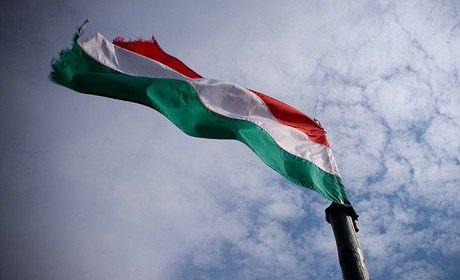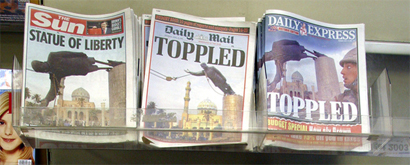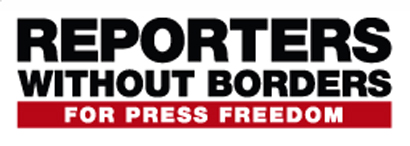In a series of interviews to UK broadcast media today, Trevor Kavanagh, associate editor at the Sun, criticised what he sees as police heavy-handedness during the dawn arrests of key Sun staff over the weekend.
In the above clip, Kavanagh gives his most controversial interview of the day to BBC Radio 5 Live’s Richard Bacon, criticising both the police operation and News Corporation’s own investigation by its Management Standards Committee. “There’s never been a bigger crisis than this [at the Sun]”, Kavanagh tells Bacon.
Here’s the full transcript:
RB: “Trevor Kavanagh told me earlier about the atmosphere in the Sun news room.”
TK: “Well despondent I would say and a feeling of being under siege I suppose.”
RB: [paraphrase] Re: Rupert Murdoch planning to fly in later this week – will he face a hostile newsroom?
TK: “Well I think the newsroom is full of people who feel deeply unhappy about the way that their colleagues, who they worked alongside for sometimes decades and who they respect and admire as supremely professional operators, have ended up being arrested, searched, put on police bail and suspended from their duties and so there is a huge amount of anger at the fact that this has happened. And, as I would point out, not a single one of them has been charged, let alone tried or convicted.”
RB: “Do some people at the Sun feel as though their parent company has hung them out to dry a bit?”
TK: “Well there’s certainly a mood of unhappiness that the company’s proudly, certain parts of the company, not News International I hasten to add, not the newspaper side of the operation, are actually boasting that they’re sending information to the police which would put these people I’ve just described into police cells.”
RB: “Forgive me, I know the structure of the company is quite complex, when you refer to another bit of the company, what does that mean, what are you talking about?”
TK: “Well there is a parent company, News Corporation, and that has set up this management committee to look into the evidence, the documentary evidence and so on, if there is any, against any members of staff. Now I think it’s fair to say that we are not opposed to the fact, that we are co-operating with the police, that’s what we should be doing and I think that if we are to get through this we need to provide them with all the co-operation we can. I think that perhaps what we best do is if we left them go through the evidence and found out what they can.”
RB: “That word ‘boasting’, what do you mean by that?”
TK: “Well I meant that when the arrests were made it was made clear that they had been arrested on the basis of evidence provided by this management committee.”
RB: “Are you saying that they shouldn’t have provided that evidence, they should have let the police come for that evidence?”
TK: “Well I think that, I don’t know how it works frankly but it does make us feel, make people in the company feel, that evidence which as of far as we know, I have to point this out, that on the basis of the evidence that’s been suggested to those who have been arrested so far, is pretty flimsy stuff. I can’t describe it in any further detail than that but it doesn’t really stand close scrutiny and people are wondering what on earth is happening.”
RB: “A lot of the evidence has come from the parent company now. It gets complex because I know that a lot of emails have been handed over. These are emails that were thought to be missing and now have been recovered and there’s something like I think 11 million of them. When you say the evidence is flimsy are you saying you more or less know exactly what evidence the police have at the moment?”
TK: “No I don’t and I’m not going to go any further into what evidence may or may not be available.”
RB: “Why do you say it’s flimsy then if you don’t know?”
TK: “Well because I have been told what the police have been asking about and those, you see the people that have been arrested have been told why they have been arrested and on the basis of that I would say that the evidence is flimsy. What other evidence is about I simply don’t know but my point today is that this police operation is wildly disproportionate with what might be the potential offences that may or may not have been committed.”
RB: “How many police are involved in this investigation?”
TK: “You have 171 officers who are involved in three separate investigations and this is the biggest single police operation in the history of British policing. It is bigger than the operation on the Pan Am Lockerbie bombing, it’s far, far bigger, totally dwarfs the operation on Milly Dowler and nobody’s died, nobody’s committed any hideous offences that I’m aware of or even been suggested as having committed such offences. It does seem to me wildly disproportionate that these police officers are raiding people’s homes with up to 20 officers at a time, ransacking their homes, going through their personal possessions, carting off sacks of paper after a dawn raid. It’s completely out of proportion.”
RB: “Why do you think it’s got here, why do you think that the operation is on such a scale, is it partly about the police trying to recover their own reputation do you think?”
TK: “I suspect that’s the case, they feel that they’ve lost a police commissioner and a deputy police commissioner and they now want to make it abundantly clear that they aren’t going to leave a single stone, floorboard, drawer, cupboard, Kellogg’s cornflake packet or any other part of a household untouched in their hunt for evidence that may or may not exist.”
RB: “Do you think the investigation would be smaller if News International had been more co-operative with the initial phone-hacking allegations?”
TK: “Well that may or may not be the case but this is not the point, the point is that as we speak 30 journalists have been suspended from their jobs, their careers may have been ruined by this and their families have been shocked and appalled by dawn raids by people acting I think in a disproportionate way when I think a polite knock on the door, perhaps after a phone call, would have unearthed precisely the same so-called evidence. I don’t know whether it’s evidence or simply other pieces of paper that’s in every household.”
RB: “But when I say co-operative in the first place I think that’s an important point because initially the company said it was all down to one individual and that turned out not to be true and they misled parliament, they misled the public, then they said these 11 million emails had gone missing whilst being transferred to the Middle East and now 11 million have been recovered. But News International may have played its own part in the police investigation being of this scale.”
TK: “Well that’s for you to suggest and it’s…”
RB: “I don’t know that Trevor…”
TK: “Let me finish my sentence…”
RB: “OK”.
TK: “It may well be the case I don’t know, I’m not involved in any of that side of things and what you have to remember is that if indeed we were misjudging things or getting them wrong completely even, we have already paid a pretty heavy price for that have we not? We have had to close one of the biggest newspapers and the oldest and one of the best newspapers in the country and 300 excellent journalists have paid the price. Now, I think that we were talking earlier about the witch-hunt and I think that the view of those who are out to get us in this witch-hunt is that nothing will satisfy them until News International has gone altogether.”
RB: “Who are those people Trevor, who do you think really is out to get the company?”
TK: “Well I think one person quite clearly is Tom Watson, I don’t think he would deny it but I don’t want to go into any further detail about who… I mean you and others can easily decide who you think might fit the bill but when you have an operation as disproportionate as this you have to wonder what they’re up to, and why.”
RB: “And I guess just finally Trevor with the story about Rupert Murdoch flying back in this week to face his hostile newsroom do you think there is any chance at all that the Sun itself could go the way of the News of the World and get closed down?”
TK: “No. I think that the Sun is a paper that if it hadn’t been invented you would have to re-invent it then. I think that the fact is this is a great newspaper, it’s loved by millions, it’s even loved occasionally by the BBC. I think the idea of losing a paper of this sort would surely be the ultimate disproportionate act would it not?”
RB: “Mmm. It’s very successful as well isn’t it? It’s one of the few newspapers left that makes a lot of money I think as well.”
TK: “It is, it’s successful for a very good reason, it’s successful because it breaks great stories, it’s successful because it represents its readers’ interests. It’s successful because it has a vigour and a lifestyle and a life force which resonates through this country. It is the greatest newspaper in this country.”
RB: “By the way the journalists that were arrested, are they back at work?”
TK: “They’ve been suspended.”
RB: “Yeah, OK. Trevor, thank you…”
TK: “Indefinitely I have to say without any prospect of knowing when any further action is going to be taken, if any.”
RB: “Is that the right call by the Sun to suspend them or do you think that’s a bit harsh?”
TK: “Well I think that, I don’t think there’s much choice once this has happened but you know it’s hard for people like me who have worked alongside people we admire and respect for, in my case, nearly 40 years with the Sun, to see them languishing at home, frustrated and unable to do anything to defend themselves and I feel very sorry for them and I know it’s causing them and their families a great deal of anguish.”
RB: “I’m sure that’s right. I didn’t realise you’d been with the paper for 40 years, did you ever see the newspaper at a lower ebb than this, have you ever been through a bigger crisis than this at the Sun?”
TK: “There’s never been a bigger crisis than this.”




